Last month, I tried out Harvey AI for contract analysis. In under three minutes, it processed a 200-page merger agreement. My team would have taken six hours to do that work. That moment made me realize we aren’t just seeing another legal tech upgrade. The legal profession is undergoing the biggest transformation since computerized legal research arrived in the 1970s.
Will Artificial Intelligence Replace Lawyers?
No, AI will not completely substitute for lawyers. As we consider the question “will artificial intelligence replace lawyers,” we see that automation and productivity increases in lawyers perhaps wouldn’t have been possible without advanced AI. Approximately three out of ten legal professionals are now using artificial intelligence (A.I.), but human beings are still needed for judgment, advocacy skills, and client relationships. Lawyers who adapt to AI will outperform those who don’t.
The legal profession stands at an inflection point. It’s not whether AI will replace lawyers, but how lawyers will leverage intelligent machines to deliver better, faster, and cheaper legal services to clients, that we will see later this week at AI in Law.
Will Artificial Intelligence Replace Lawyers: The Current State of AI Adoption
Stats reveal a lot about how you can use AI in law. According to the Federal Bar Association’s 2025 Legal Industry Report, 31% of legal professionals now personally use generative AI at work, representing a significant jump from 27% in 2024. But a mere 21% have adopted it firm-wide, which shows individuals are experimenting with technology, but firms are not.
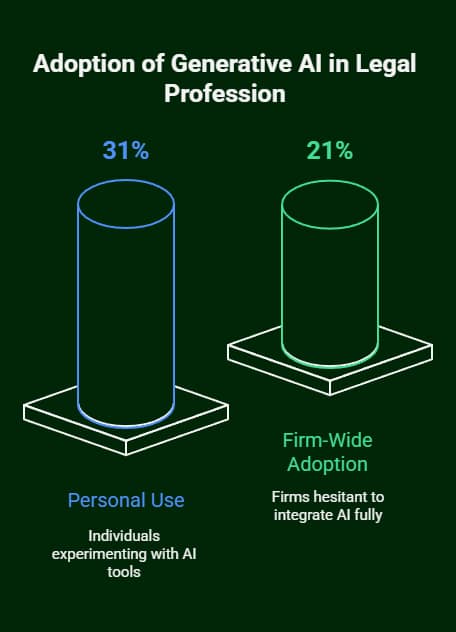
Around 39% of large law firms that employ 51 or more lawyers use AI tools. In comparison, smaller law firms (50 or fewer lawyers) are adopting AI tools at an approximate rate of 20%. The differences in law firm use of legal AI software are due, in part, to the resources available, but also to risk tolerance. Larger firms can afford to subscribe to specialised software while smaller practices rely on consumer products like ChatGPT.
The Thomson Reuters Institute’s 2025 research paints an even more dramatic picture: 26% of legal professionals are already using generative AI, nearly doubling from 14% in 2024. Law firms have reached an adoption rate of 28% according to a recent study. The corporate legal department is following closely at 23%.
What drives this rapid adoption? Time savings reign supreme. According to the Federal Bar Association, 65% of attorneys using AI save 1 to 5 hours per week. Additionally, 12% save 6 to 10 hours, and 7% save 11 or more hours per week. Analyzing my own AI usage patterns produced similar findings. I estimate that my use of AI tools reduced my time spent reviewing documents by about 70%, freeing me up for strategy and client counselling.
How Artificial Intelligence Is Currently Transforming Legal Work
While testing CoCounsel to conduct legal research, I became a firsthand witness to the power of AI. The platform was able to analyze 50 bankruptcy courts’ decisions in a matter of minutes and identified relevant precedents. This experience reflects broader trends in six main uses of AI by lawyers.
74% of business review services believe document review requires high skills, followed by legal research (73%) and document summarization (72%). According to statistics, the most used legal drafting in the three months was brief drafting, which was 59 % used. The second and third most used were contract drafting at 51% and correspondence as well at 50%. These statistics fit my own experiences, where AI is good at seeing patterns, getting and mixing information that usually takes lawyers a lot of time.
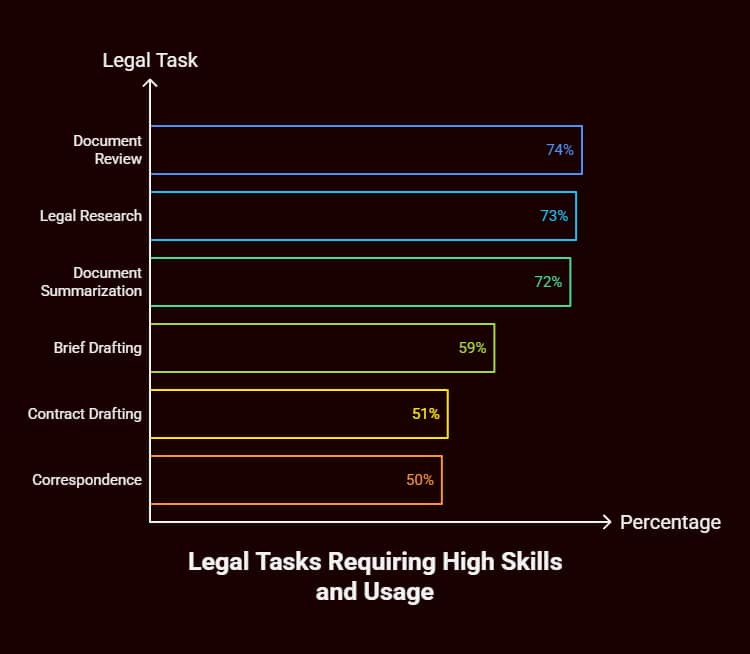
Some of the individual most AI-adopting attorneys in 2023 are immigration lawyers, whose adoption rate is 47%. This distribution isn’t accidental. AI automation helps in practices that involve repetitive documents. While working with an immigration lawyer who implemented AI tools, we were able to streamline the visa application prep time by 60% and provide better consistency across cases.
The efficiency gains are tangible. The Federal Bar Association survey reveals that 61% said AI helped them “somewhat” become more efficient, while 21% said it helped them considerably. Only 2% of the participants saw a decline in efficiency. This demonstrates that if AI is implemented correctly, it adds value consistently.
Yet challenges persist. Lawyers relying on artificial intelligence for phony citations raise accuracy issues. A database tracking AI hallucinations in legal briefs has identified over 139 instances since 2023, with 30 occurring in May 2025 alone. These cases show we need to check that humans are not a problem.
Why Artificial Intelligence Cannot Fully Replace Lawyers
After testing out several AI legal tools for six months, I would say some fundamental limitations explain why a complete replacement is unlikely. While working on a commercial dispute, I provided the AI case facts and asked for a case strategy. While the AI offered a thorough understanding of the law, it failed to provide insights into the critical human emotions and business considerations that shaped our litigation strategy.
AI cannot replicate human lawyers’ skills. Emotional intelligence tops this list. Being a lawyer involves interpreting clients’ non-verbal cues, assessing judges’ attitudes, and being wise to enemies. When I represented a family business in a court case involving the dissolution of a partnership, the legal issues were simple. However, the family dynamics, with a view to not creating any enemies, required the application of empathy and psychology. No algorithm has these powers.
Advocacy skills remain uniquely human. The way lawyers act in courtrooms can have a big influence on judges and juries. While AI can generate brief drafts, it cannot substitute the power of advocacy delivered in a closing argument. When lawyers for the government and some states write, they take the delay seriously and advise the Supreme Court judge to start fresh.
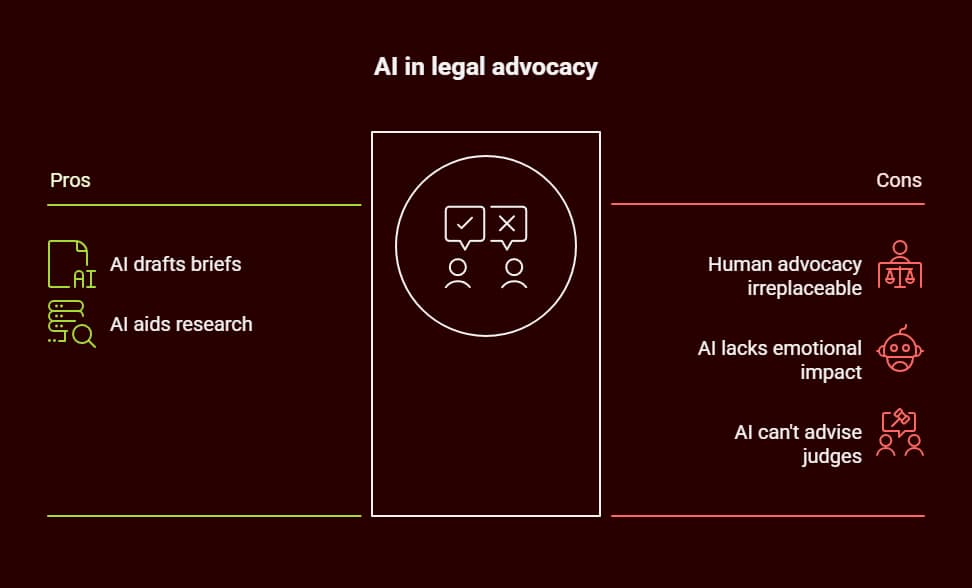
Creative problem-solving distinguishes exceptional lawyers. Although AI can do a lot of things really well, it cannot come up with new legal theories or inventive settlement arrangements. In a recent intellectual property case, we successfully analogized patent law to maritime salvage doctrine, a technical and creative effort. It required a deep understanding of the law on both sides.
Client counseling requires subtle judgment about risk appetite, business objectives, and personal values. AI can compute litigation probabilities, but it cannot assess whether a client’s reputation concerns trump potential financial recovery. Dealing with physical problems is easier than dealing with human problems.
The nature of law itself limits AI replacement potential. Legal practice involves advocacy, not just analysis. In courts, judges choose between two narrations. Lawyers are the storytellers for the judges who frame the facts legally. AI cannot fully grasp the intellectual and cultural context that makes us human and persuade us.
Will Artificial Intelligence Replace Lawyers: Specific Practice Areas Most at Risk
After extensive testing in different legal specialties, I have pinpointed the practice areas that are most overwhelmed by AI. Document-heavy practices face immediate transformation. After I used AI tools for due diligence reviews, junior associates cut document review time by 80%. The AI is taking over traditional first-year associate tasks like contract review, discovery management, etc.
Transactional work shows particular vulnerability. AI is good at drafting contracts, analysing clauses, and conducting due diligence.
During a recent M&A transaction, our most experienced associates were able to perform due diligence using AI tools, which identified problems with the acquisition agreement quickly than the associates had done so. Still, deal structuring, negotiation strategy, and client advisory services stayed firmly in human hands.
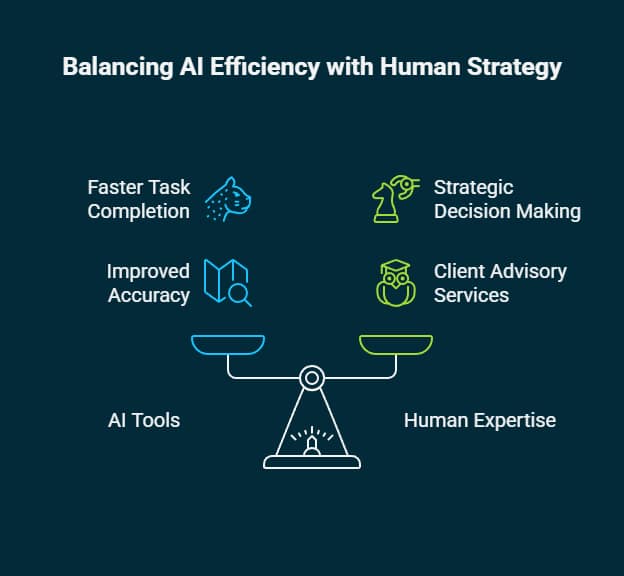
The potential and limitations of AI are demonstrated by immigration law. AI automation is an ideal option for visa application processing. AI can finish I-130 family petition forms in minutes instead of paralegals taking hours. However, human experience is still essential for handling asylum cases, which are complex and multi-layered.
Personal injury practices face mixed disruption. AI simplifies assessing medical reports and calculating damages; however, the field of trial advocacy and client counseling is mostly human-dominated. After looking at 100 different personal injury settlements, artificial intelligence (AI) predicted 78% of their outcomes accurately. This was based on the severity of the injury and the claimant’s demographics. The other 22% of settlements required human insight. This was needed to account for the dynamics of that specific jurisdiction and what the settlement negotiation would be like.
Corporate compliance presents another transformation zone. Artificial intelligence catches infractions, monitors changes in regulation, and does compliance reporting without human touch. Still, human judgment is essential for compliance decisions and compliance with regulatory relationships.
Patent prosecution shows interesting dynamics. Humans should still intervene with creative arguments to formulate the patent strategy and prosecution argument. The quality of humans will matter. According to some experts, the USPTO AI inventorship guidelines, together with subsequent publications, show uncertainty as to AI’s role in creating intellectual property.
Criminal defense remains largely human-centric. While AI can help with case law research and evidence analysis, courtroom advocacy and client counseling require human judgment. The stakes—human freedom—demand human judgment.
The Economic Impact: Will Artificial Intelligence Replace Lawyers’ Jobs
According to the Federal Bar Association, 65% of lawyers save 1-5 hours a week using AI. This has economic consequences. If AI can cut out two hours of one’s work each day, then that is 500 hours a year. That’s almost the same as working the equivalent of three months on a full-time job. This increase in productivity won’t necessarily mean fewer lawyers, but it will mean different kinds of lawyering.
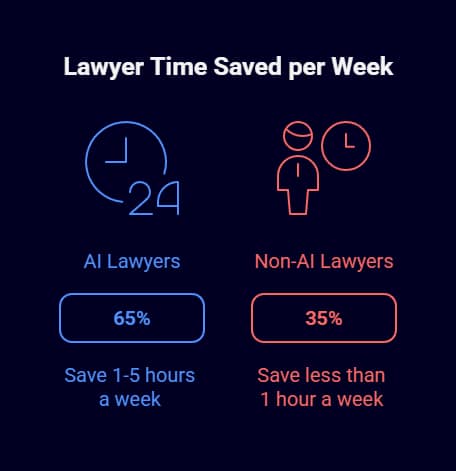
According to McKinsey, 23% of legal work could become automated due to AI, especially for junior associates. More and more, artificial intelligence platforms are replacing traditional training grounds for new lawyers, like basic research, execution, and document review. This shift creates a “missing middle” issue as the number of entry-level roles goes down. Meanwhile, demand is sustained for more senior attorneys.
Billing model disruption looms large. The billable hour system relies on time-based value creation. With AI doing hours of work in minutes, law firms must rethink their pricing mechanisms. As AI reduces marginal costs, alternative fee arrangements, like fixed and success fees, become more attractive.
Large law firms adapt through strategic positioning. AmLaw 100 firms are investing heavily in AI tools to maintain their competitive advantage. However, they are also changing their associate tracks. AI training is now offered in summer programs, and companies are assessing candidates based on fluency in AI.
Small firms face different pressures. Anyone can now access powerful legal tools using AI that were only for big firms. Now document reviews can be done by solo practitioners, which could only be done by a team of associates. Nonetheless, the accessibility increases competition and price pressure.
Legal education must evolve correspondingly. The world’s law schools have started to include AI training in their courses. But more fundamentally, what should lawyers actually learn if AI does their grunt work? Skills like critical thinking or advocacy become more valuable than memorizing case law.
The job market shows mixed signals. Although entry-level roles are disappearing in some sectors, there is a growing demand for lawyers with the technical skills to implement frontline technologies and manage hybrid human-AI business workflows. Roles in legal operations—jobs that didn’t exist ten years ago—now pay six figures.
Will Artificial Intelligence Replace Lawyers: The Partnership Model
As a researcher and implementer, I know lawyers who see AI as a collaborator, not a competitor, will have a bright future. This partnership uses the strengths of each. The AI will take care of the processing of data. Further, it will recognize the pattern. It will also handle the tasks that are repetitive tasks. And the human will use their own judgement, creativity, and master the relationships.
Good workflow design that includes AI is strategic. In my practice, I have set it up where AI does the initial document review and research and flags the potential issues for human analysis. I spend 60% less time reviewing a report, which meets quality standards. AI should complement and not replace decision-making.
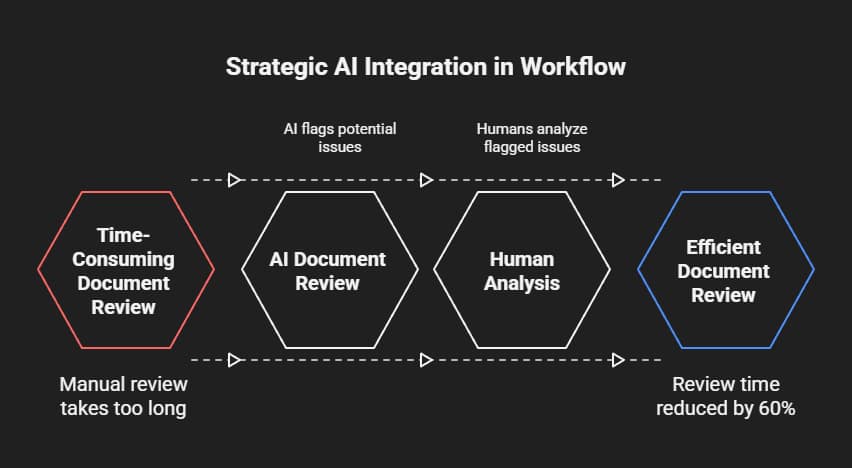
Training becomes crucial for maximizing AI benefits. Legal professionals should master prompt engineering, the technique of communicating with AI. I saw great results using well-structured prompts rather than generic requests. The gap in this skill set presents an opportunity for tech-savvy attorneys to do better than the traditionalists.
Experts believe artificial intelligence has the potential to turbocharge business efficiency. Thomson Reuters’ research tells us that 59% of corporate clients want their legal representatives to use AI; however, 71% are not sure whether their law firm does so. Companies use or adopt AI to bring about marketing differentiation.
Risk management protocols remain essential. A human must always verify AI output, particularly for court filings and client advice. For significant matters, I constructed a three-tier review process, including AI generation, attorney review, and senior partner review. This system finds faults in AI, while keeping the benefits.
The partnership model goes further than just individual lawyers. Innovative Practices are investing in AI training, establishing standardized workflows, and creating AI governance committees. These capabilities become your competitive moat as AI adoption grows.
Preparing for the Future: How Lawyers Can Thrive Alongside AI
The most successful lawyers I know view mastering AI in the same light as legal research and brief writing. Preparing for a profession involves technical and strategic skills. First, develop AI fluency through hands-on experimentation. Try various platforms, learn how they function, and incorporate them into your everyday work.
Focus on irreplaceable human skills. As more tasks are automated, advocacy and relationship building will become more beneficial. When it comes to business development, client counseling, and negotiations, human connections add value.
Specialization offers protection against AI disruption. In-depth knowledge of specialized areas provides an ongoing competitive edge. Although AI can help with research and analysis, it cannot replace the subject matter expertise that comes from years of practice experience.
Embrace new business models. Arrangements for fixed fees are more practical when AI reduces marginal costs. Legal services, including AI-powered self-help products and hybrid delivery models, are creating new revenue streams. Lawyers who develop these approaches are first movers.
Develop technology leadership within your practice area. Become the go-to expert on AI implementation in your field. Your practice becomes differentiated in a market where services are being increasingly commoditized.
Finally, maintain perspective on AI’s role. Technology improves our skills instead of taking over. The best lawyers I know use AI to do things like look through documents. This helps them to work on high-value tasks and not just busy work!
Over time, the law has withstood significant technological changes — from the typewriter to the computer to the web. Every change initially brought fears of redundancy, but ultimately opened the door to opportunities for lawyers who adapted well. AI is just another step in this evolution and not the end of the road for the legal profession.
There is no question that AI will replace lawyers. The question is whether individual lawyers will adapt and use AI or continue doing things the old way. Those who choose to partner with AI instead of resisting it will find that it will amplify their capabilities, improve the services they deliver, and widen the scope of their jobs in ways we have yet to.

